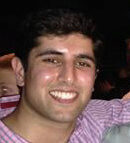
Guest post by Mack Institute student research fellow Neil Assur
As a former consultant and data scientist, structured thinking is a relative strength of mine. For years prior to Wharton I spent my days poring through data, applying frameworks and statistical algorithms to better address business challenges.
As a prospective entrepreneur, however, unstructured thinking — or, rather, learning to structure an approach to a very broad, nebulous challenge — is a more crucial skill. I learned this firsthand through my experience as a research fellow at Wharton’s Mack Institute for Innovation Management. My challenge: find and develop a business idea that can take advantage of unmet needs in the nutrition space.
At first, I was bewildered by the scale and scope of the project; where would I even begin? Over time, however, with some superb guidance from my liaison, Associate Director Samantha Ortiz at the Mack Institute, I began to piece this jigsaw puzzle of a project into a clear business idea. Two months later, after talking with dozens of professors, dietitians, surgeons, hospital administrators, patients and nutritionists, we came up with BariSmart: a recovery program for post-operative bariatric (weight loss) surgery patients.
Reflecting on this, it seems a bit ridiculous — if you had told me even six months ago that I would be working on developing an idea dedicated to post-operative bariatric nutrition, I would have laughed it off (and probably offered to wager a pretty large sum of money on it too). Yet, here I am. There are about 200,000 life-changing bariatric surgeries each year, and, especially during the six-week post-operative recovery period, proper nutrition is crucial in order to avoid adverse effects. During this period, however, many patients lack guidance, education, emotional support, and even appropriate knowledge about what, when, and how much to eat. BariSmart aims to change all this by structuring and guiding patients through the recovery period by combining a meal/supplement delivery service with a technology-based monitoring solution.
The Mack Institute allowed me to test my work by providing me with opportunities to not only develop the business idea from scratch, but also see the project gather momentum. Thanks to their connections, we were able to secure seed-stage funding for BariSmart, and are currently in talks to partner with hospitals, distribution companies, and food manufacturers to take this program off the ground. More importantly, the Mack Institute’s connections with hospital administrators and patients helped me validate my project idea and obtain feedback.
Wharton’s motto, “Knowledge for Action,” is a small phrase that resonates with me given my work on this project. My classes this semester were useful, allowing me to understand the theory necessary to structure and solve business challenges. My work with the Mack Institute, however, gave me the opportunity to put this new-found knowledge into practice. Regardless of outcome, this has been an incredible learning experience that will (hopefully) be a stepping stone to something greater in the future.
 Neil Assur (WG’16) is a current MBA candidate at the Wharton School of the University of Pennsylvania. Prior to matriculating into Wharton, Neil worked as a data-scientist for Liberty Mutual Insurance company, where he was responsible for applying advanced statistical algorithms to “big data” operational challenges. During his tenure, Neil and his team focused particularly on the claims process, where they were able to employ predictive modelling to significantly improve claims efficiency and customer satisfaction. In recognition of his work, Neil was invited to present at the Liberty-Mutual Predictive Modelling Forum–the youngest such analyst to be awarded this prestige. In addition, Neil is the founder of the Boston-based non-profit “Reach Higher,” an organization dedicated to providing under-resourced individuals with free educational services.
Neil Assur (WG’16) is a current MBA candidate at the Wharton School of the University of Pennsylvania. Prior to matriculating into Wharton, Neil worked as a data-scientist for Liberty Mutual Insurance company, where he was responsible for applying advanced statistical algorithms to “big data” operational challenges. During his tenure, Neil and his team focused particularly on the claims process, where they were able to employ predictive modelling to significantly improve claims efficiency and customer satisfaction. In recognition of his work, Neil was invited to present at the Liberty-Mutual Predictive Modelling Forum–the youngest such analyst to be awarded this prestige. In addition, Neil is the founder of the Boston-based non-profit “Reach Higher,” an organization dedicated to providing under-resourced individuals with free educational services.



